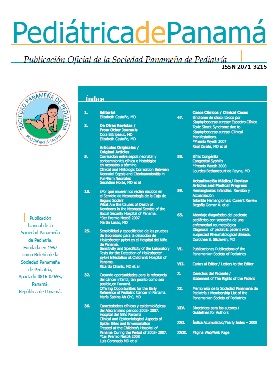Pompe Disease in Children: First case reported in Panama
Authors
DOI:
https://doi.org/10.37980/im.journal.rspp.20201694Keywords:
Early-onset Pompe disease, hypertrophic cardiomyopathy, glycogenosis type II, acid alpha-clucosidaseAbstract
Pompe disease is a rare hereditary disease caused by deficiency of the enzyme alpha glucosidase acid (AGA) responsible for degrading intralisosomal glycogen. It is considered a deposit disease and exists in two forms: infantile or early onset and late onset with manifestations after one year of age. The infantile form is rapidly progressive, causing death before the first year of life if there is no timely and adequate therapeutic intervention. From the development of enzyme replacement therapy (ERT), early diagnosis becomes more relevant. The case of an 8-month-old patient with respiratory distress, hypotonia, impaired development and diet is presented. Cardiological examination showed findings of cardiomyopathy. Clinical findings point to Pompe disease. The test is done on filter paper that reports positive for Pompe disease. However, the patient dies on the 25th day of hospitalization before starting enzyme replacement therapy. It is the first case reported in our environment.
Downloads
Published
Issue
Section
License
Derechos autoriales y de reproducibilidad. La Revista Pediátrica de Panamá es un ente académico, sin fines de lucro, que forma parte de la Sociedad Panameña de Pediatría. Sus publicaciones son de tipo gratuito, para uso individual y académico. El autor, al publicar en la Revista otorga sus derechos permanente para que su contenido sea editado por la Sociedad y distribuido Infomedic International bajo la Licencia de uso de distribución. Las polítcas de distribución dependerán del tipo de envío seleccionado por el autor.






